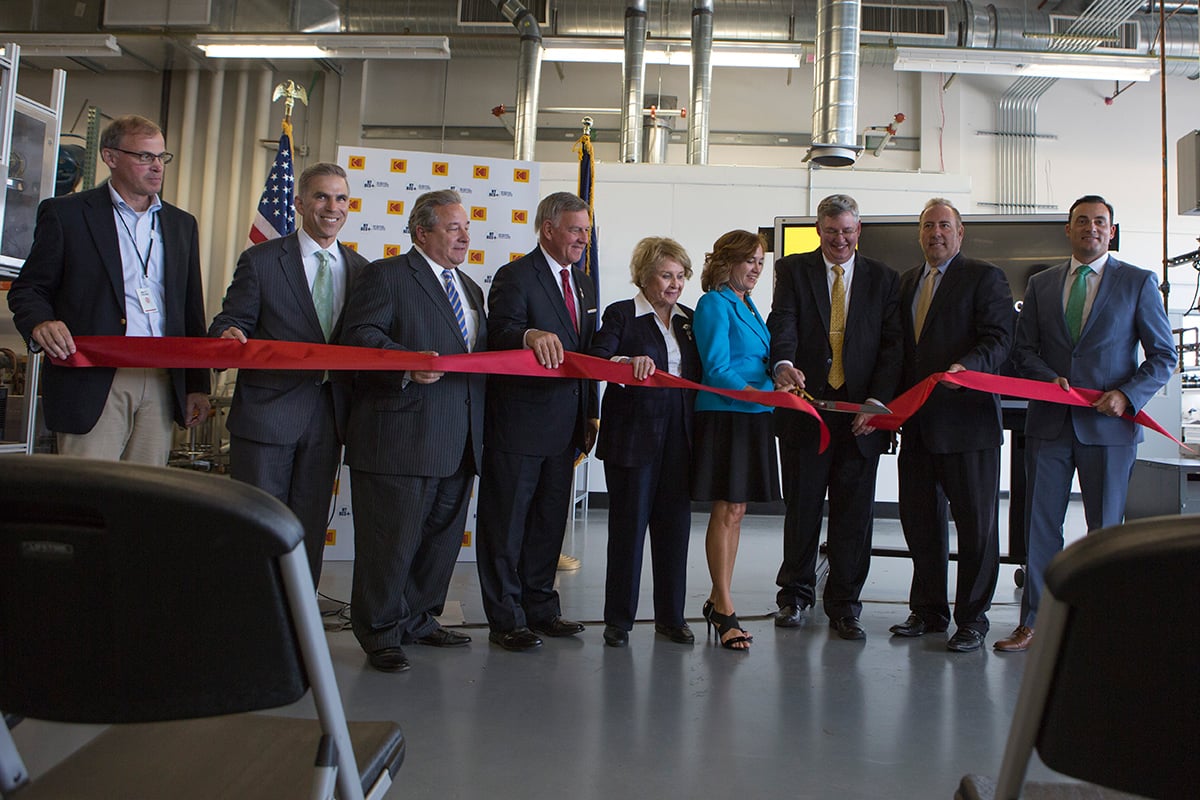
Kodak, the tech company best known for producing photographic film and imaging equipment, has inaugurated the Kodak Cell Assembly Center, a new facility aimed at accelerating development and scale-up of advanced batteries for energy storage.
A grand opening was held at the centre, which is at Eastman Business Park, Rochester, New York. The event was attended by officials from Kodak, formally trading as Eastman Kodak Company, with local and state representatives.
Enjoy 12 months of exclusive analysis
- Regular insight and analysis of the industry’s biggest developments
- In-depth interviews with the industry’s leading figures
- Annual digital subscription to the PV Tech Power journal
- Discounts on Solar Media’s portfolio of events, in-person and virtual
Also in attendance were representatives from New York’s public benefit economic development group, Empire State Development Corporation, which through a grant has funded US$1.2 million of the centre’s total cost of around US$5.9 million. The centre’s launch was announced at the beginning of this year.
Empire State Development CEO and Commissioner Howard Zimsky said the Assembly Center “further establishes New York as a world-class hub for energy storage and technology”.
Collaboration with NY BEST and DNV GL
Kodak has collaborated with trade group and technical development association NY BEST on the creation of the battery centre. NY BEST, in addition to being a trade association advocating for the views of its stakeholder members across the industry, is also heavily involved in technology commercialisation initiatives and has its own battery testing facilities.
Previously, the group has hailed the efforts of New York and in particular the administration of Governor Cuomo, who initiated New York REV, a wide-ranging grid modernisation and clean energy transition plan for the state. In a 2015 interview, NY BEST chief William Acker said REV (‘Reforming the Energy Vision’) could be a “valuable lesson” for the rest of the world, while the trade group has said that the state needs 2GW of multi-hour energy storage by 2025 and 4GW by 2030 to achieve its renewable energy target of 50% renewables by the latter of those two years.
Acker said that the new centre, also worked on by technical assurance experts DNV GL, will complement existing “state-of-the-art facilities for battery development, prototyping and commercialisation” in New York.
There are already some 3,900 people working in the energy storage industry within New York, according to New York State Energy Research and Development Authority (NYSERDA), as of January 2017, a 30% growth over four years. Between 2012 and 2015, revenues flowing into New York companies from the global market reached US$908 million, a 50% growth in three years.
What it does
The centre will provide pilot manufacturing services on two multi-user battery cell assembly lines to energy storage companies and battery makers. With the addition of Kodak’s Coating Services division onsite to develop electrodes and with NY BEST’s own test and commercialisation centre, as well as the Rochester Institute of Technology’s Battery Prototyping Center nearby, users of the facilities will be able to coat, assemble and test their devices and systems.
Kodak said the facility will not be limited to batteries and could also work on ultracapacitors and other technologies for storing energy. Allowing companies to execute those three core processes for large- and small-scale energy storage within one localised hub is expected to streamline product development and help promising technologies traverse the dreaded ‘Valley of Death’ to reach commercialisation.
Mercedes-Benz Research begins partnership on next-gen battery tech
Mercedes-Benz, which has launched its own stationary energy storage systems for homes, businesses and utilities and is planning EV and hybrid launches in the future, has begun a joint research programme into high purity thin-film lithium metal anodes with start-up alpha-En Corporation and Princeton University.
Mercedes-Benz Research and Development North America and the prestigious university will investigate alpha-En Corporation’s pure lithium metal thin-films in advanced battery systems. Alpha-En makes lithium metal nano-rods aimed at improving performance in both EVs and stationary energy storage systems.
“We are very pleased and proud to be part of this joint research program with one of the world’s leading luxury automobile manufacturers at one of the most preeminent University and research institutions in the world,” alpha-En Corporation executive chairman and founder Jerome Feldman said.
“Lithium metal batteries have long been considered the Holy Grail of energy storage,” he added.






